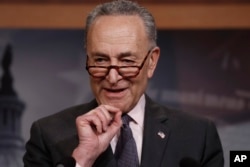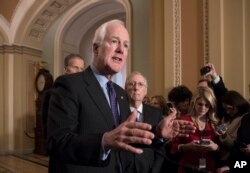A flurry of proposals to curb gun violence emerged Thursday in the U.S. Senate, one day after President Donald Trump voiced support for multiple firearms restrictions, including some that many Republican lawmakers and gun rights advocates strongly oppose.
"There is widespread agreement that we must act now to prevent another tragedy like Parkland from happening anywhere else, ever again," said Republican Senator Marco Rubio of Florida, referring to last month's shooting in his state in which 17 people were killed at Marjory Stoneman Douglas High School.
Rubio introduced a proposal to strengthen the background check system for gun purchases, provide federal funding for school crisis intervention teams and empower law enforcement to obtain court orders to seize firearms from those deemed to be a public safety risk.
Rubio's proposal was far less sweeping than the measures Trump appeared to endorse Wednesday in a televised White House meeting with lawmakers of both political parties, which included universal background checks for buying firearms and raising the minimum age for purchases of assault-style rifles from 18 to 21.
Trump also urged lawmakers not to fear a politically powerful lobbying group, the National Rifle Association (NRA), earning praise from Democrats.
"The president said a lot of things right yesterday," Senate Minority Leader Chuck Schumer of New York said. "Importantly, the president acknowledged that taking meaningful steps to improve gun safety is going to require bucking the NRA."
Schumer unveiled a Democratic proposal to extend background checks for purchases of firearms at gun shows and over the internet, and to allow family members and law enforcement to file court petitions to remove guns from those suspected of violent intentions. He also urged a debate on whether to ban semiautomatic rifles, also known as assault weapons.
"If the president can get some Republicans to vote for the assault weapons ban, and he indicated openness to supporting it yesterday, we can pass it soon," Schumer said. "We must work together to get it done. Words alone will not prevent the next mass shooting."
For their part, Republican lawmakers responded cautiously to Trump's seeming endorsement of sweeping new gun laws.
"Well, it certainly livened things up around here," Louisiana Senator John Kennedy said of the president's remarks. "I think, whether you like it or not, we all have a constitutional right to bear arms."
"It [the White House meeting on gun violence] was more of what I would call a brainstorming session," the Senate's No. 2 Republican, John Cornyn of Texas, said. "We got a lot of different ideas, but it [a bill] is going to have to get 60 votes to pass in the Senate, and that's really the acid test of where the political support is."
"I think there are measures where we can come together and there are probably measures where we can't," said California Democratic Senator Dianne Feinstein, who sat next to Trump during Wednesday's meeting. "For me, the seminal problem is the number of military assault weapons converted for civilian use that are out on the streets, easy to fire, and accessible to buy or obtain."
At the White House, meanwhile, Trump held another meeting on Thursday with families of shooting victims as well as mass shooting survivors.
The president also weighed in on Twitter, underscoring support for background checks for gun purchases but also nodding to gun rights advocates who often cite the U.S. Constitution's provision on firearms:






